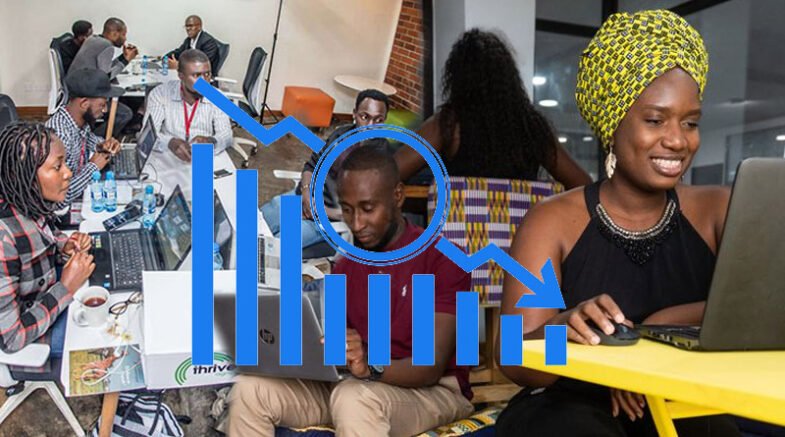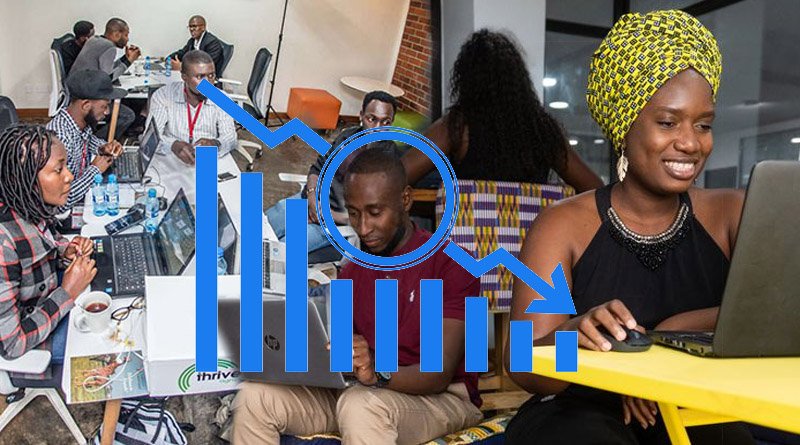Funding fell to $649.30m in the first quarter of 2023 as the industry struggled with a weak global economy.

In the first quarter of 2023 compared to the same period in the previous year, funding for African startups and the Nigerian tech ecosystem fell by 57.2%, according to Disrupt Africa. Funding fell to $649.30m in the first quarter of 2023 as the industry struggled with a weak global economy.
Disrupt Africa report stated that only 87 African startups received funding in 2023, which is significantly fewer than the 175, which occurred in Q1 2022. By April 1, 2022, $1.52 billion had already been raised for African startups.
In the report, it was stated that “year-over-year funding looks set to decline by more than 50%” because “last year’s Q1 ended up accounting for around half the startups and half the total investment for the entire of 2022.”
According to data from Africa Big Deal, a data insight company that monitors deals worth more than $100,000, total funding (including exits) was $1.3 billion in the quarter under consideration. With exits taken into account, this represented a 29% year-over-year decline, which rose to a 52% year-over-year decline.
“The number of $100k+ deals is also a matter for concern,” the statement read. “Just over 150 were recorded in Q1 2023, less than half the Q1 2022 tally (300+).”
In fact, to find a quarterly number of deals this low, you must go all the way back to 2020. Worse yet, with only $66 million raised, March 2023 was the worst month in 2.5 years (since August 2020) and the first time since 2020 that start-ups in Africa had raised less than $100 million in a single month. Between 2022 and 2023, March funding decreased by an 11x factor.
Nigeria, Africa, and the rest of the world’s tech startups are predicted to have a terrible year in 2023. In the first quarter of 2023 (165,622), there were already more layoffs of tech workers than there were in all of 2022. (164,411).
In addition, falling interest rates, rising inflationary pressures, and concerns about a global recession have all contributed to a steady decline in funding for the global tech ecosystem since 2022. Nevertheless, in 2022, startups on the continent were successful in raising $4.85 billion.
The data insight firm commented on this expansion by saying, “So, yes, 2022 was definitely a good year, yet talks of slowdown and uncertainty dominate the second half of the year, and the mood isn’t always that celebratory.
Not to mention, if the H2 trend were to persist, 2023 might mark the beginning of the ecosystem’s decline in absolute numbers. But with so much money available for use, let’s hope that when the clouds eventually part, the ecosystem will seize the opportunity to once again prove to us that it has more than one trick up its sleeve.
The clouds have not yet lifted and could continue to do so for another 18 to 24 months. Nkiru Amadi-Emina, the founder of Pivo, recently expressed this opinion to The PUNCH.
“I do think that this dynamic will continue for about 18 months,” she said. “We are likely to see more layoffs. We have seen a couple of them over the last couple of months. Companies are learning that we need to be more conservative.”
The ability of startups to close rounds is impacted by professionalism and investors’ interest in the profitability of startups before investing, according to Mark Kleyner, co-founder of Dream VC, who recently spoke with The PUNCH. The seriousness or professionalism surrounding investing, he recently said, is the biggest change in how investors interact with founders.
In the years 2021–2022, many investors supported startups without performing adequate due diligence and with scant oversight of the investee’s operations. As investors begin to consider how changing global expectations, particularly from late-stage investors, of startups, the dynamics of raising funding have significantly changed.
